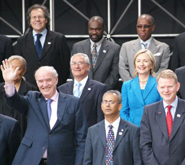“The sub-regional integration institutions will gather more strength. But we still need a forum for hemispheric dialogue.”
José Miguel Insulza, secretary general of the Organization of Americas States, spoke with AS/COA Online Managing Editor Carin Zissis following an Americas Society/Council of the Americas event about the OAS role in promoting democracy in Latin America (Listen to audio of Insulza’s remarks). In recent months, the OAS has played a central role in negotiations related to regional matters, including a vote on autonomy in Bolivia’s Santa Cruz province and the March Andean standoff between Colombia and its neighbors Ecuador and Venezuela after a Colombian attack on a FARC camp inside Ecuador’s borders. “What I think is that the OAS has to prove itself as the main forum for political dialogue in the Americas, prove itself to be a bona fide intermediary in the problems among or within countries, and especially act very independently based only on Inter-American law,” said Insulza of the organization, now in its sixtieth year.
AS/COA: During your remarks you discussed the recent Andean crisis. There’s been discussion about the role of the OAS in that matter. You talked about how quickly the OAS had to respond to that issue. Can you talk about how that has affected the OAS and the process by which various issues are handled?
Insulza: We have tried very hard this year, not only to be relevant but to be timely at the same time. I fear all the time that something will happen as it did with the Venezuela crisis; in 2002, after the president was deposed, the council met and they were still meeting when the president was re-instated.
I think [the handling of the recent crisis] has given us a lot of legitimacy to work on the process. Basically, we were very evenhanded. We understood the Colombian motives, we understood the Ecuadorian rights, and we managed to forge a consensus on that.
 Updated June 10 - With the 40th OAS General Assembly hosted by Peru this week, U.S. Secretary of State Hillary Clinton traveled to Latin America and Caribbean for the seventh time since joining the Obama cabinet. The summit marked nearly a year since the overthrow of then-Honduran President Manuel Zelaya as well as continued disagreement between members over whether the Central American country should be brought back into the OAS fold. Clinton not only urged for Honduras’ readmission, but petitioned OAS members for support on sanctions against Iran over that country’s nuclear policy. In a trip that takes the secretary to Ecuador, Colombia, and Barbados, she delivered remarks in Quito outlining the shared U.S.-Latin American responsibility too reduce social inequality in the region.
Updated June 10 - With the 40th OAS General Assembly hosted by Peru this week, U.S. Secretary of State Hillary Clinton traveled to Latin America and Caribbean for the seventh time since joining the Obama cabinet. The summit marked nearly a year since the overthrow of then-Honduran President Manuel Zelaya as well as continued disagreement between members over whether the Central American country should be brought back into the OAS fold. Clinton not only urged for Honduras’ readmission, but petitioned OAS members for support on sanctions against Iran over that country’s nuclear policy. In a trip that takes the secretary to Ecuador, Colombia, and Barbados, she delivered remarks in Quito outlining the shared U.S.-Latin American responsibility too reduce social inequality in the region.
